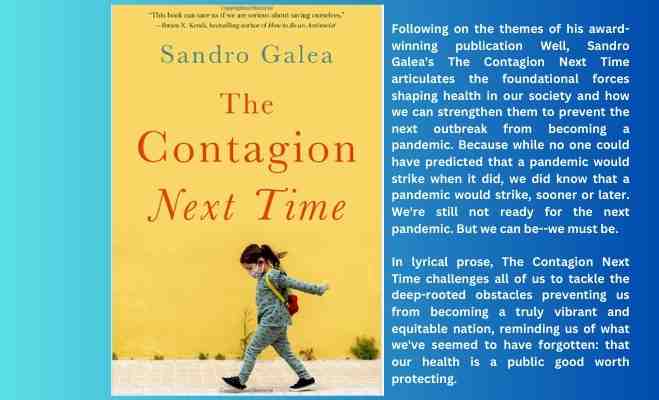the contagion next time
In the book ‘the contagion next time,’ the author, Sandro Galea dean and Robert A. Knox Professor at Boston University School of Public Health, strongly argues for improving public health and helping people understand it better after the Covid-19 pandemic.
The book focuses on preparing for future health crisis beyond vaccines and medical care. It looks at the political, environmental, and economic factors that caused the crisis.
Using scientific facts and historical stories, Galea shows that health is about more than just medicine.
For example, Galea talks about how people live longer when society changes and when they have more money. He explains how these things made Covid-19 worse, especially for families with less money and Black families. The book also discusses how racial differences and climate change affect public health. Galea tries to look at everything fairly and think about the big picture.
The book also challenges how we think about the world’s response to Covid-19. It says that we shouldn’t just focus on the violent crimes we see on TV but also pay attention to other diseases like kidney and heart disease that cause more deaths. Galea wants us to care about others and work together to improve things. He says we should think about why crises happen and not just react to them.
At the end of the book, Galea reminds us how important it is to learn from this crisis to be ready for future health emergencies, like the Delta variant. ‘The Contagion Next Time’ is not just about medicine; it’s about improving society. Galea did a lot of research and cares about making things better for everyone.”
The Contagion Next Time is a timely and important book. It provides a much-needed roadmap for improving public health in the 21st century.
Here are some additional points that Galea makes in the book:
- The importance of social cohesion: Galea argues that social cohesion is essential for good health. When people feel connected to their community and have a sense of belonging, they are more likely to take care of their health.
- The need for equity: Galea argues that we must create a more equitable society to improve public health. This means addressing the root causes of inequality, such as poverty, racism, and sexism.
- The power of innovation: Galea believes innovation is key to improving public health. He cites new technologies and approaches being used to improve health, such as telemedicine and mobile health apps.
Galea’s book is a call to action for all of us. It challenges us to think about public health in a new way and to take action to create a healthier world.
Here are some specific examples of how we can improve public health including :
- Invest in social programs: We can invest in social programs that address the root causes of poor health, such as poverty, lack of access to healthcare, and exposure to environmental toxins.
- Take steps to mitigate climate change: We can take steps to mitigate climate change, such as reducing our carbon emissions and investing in renewable energy.
- Promote social cohesion: We can promote social cohesion by building strong communities and providing opportunities for people to connect.
- Create a more equitable society: We can create a more equitable society by addressing the root causes of inequality, such as poverty, racism, and sexism.
We can create a healthier world for ourselves and future generations by taking these steps.
Disclosure: At Blogzah, we value transparency and provide honest, unbiased book reviews. This review is not an endorsement, and we received no payment from the publisher. We only recommend books that inspire us. We disclose this in accordance with FTC guidelines.

















